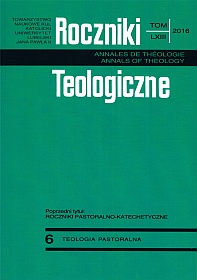Matrimonial communio personarum in the perspective of uniqueness and Trinity of God
Abstract
The central truth of Christian revelation is that absolutely prime are the Three Divine Persons including Their mutual clinging and unity. Their communion constitutes the essence, archetype of all realities and it is something according to what everything should be shaped. The Trinity and matrimony of people constitute two completely different realities. Taking into consideration the above assumptions concerning the analogy between The Trinity and marriage, selected qualities resulting from uniqueness and trinity of God (relationality, uniqueness, mutuality, equality, love, communication) have been presented, as well as directions for marriage and its united life arising from them. The above considerations point clearly that profound theological glance at the main revealed truth about God in the Three Divine Persons also allows to discover essential inspirations for marriage and family life as well as spirituality related to it in everyday life.
References
Bartnik Cz., „Osoba” w Trójcy Świętej, „Collectanea Theologica”, 53 (1983), f. 2, s. 17-27.
Cichosz W., Miłość trynitarna jako fundament kształtowania relacji osobowych, „Communio”, 26 (2006), nr 2, s. 109-119.
Danielou J., Trójca Święta i tajemnica egzystencji, Kraków: Znak 1994.
Grześkowiak J., Małżeństwo jako analogia Trynitarna, „Roczniki Teologiczno-Kanoniczne”, 29 (1982), z. 6, s. 41-54.
Jagodziński M., Sakramenty w służbie Communio, Warszawa: Wydawnictwo Uniwersytetu Kardynała Stefana Wyszyńskiego 2008.
Jan Paweł II, Wierzę w Boga Ojca, Città del Vaticano: Libreria Editrice Vaticana 1987.
Jan Paweł II, Wierzę w Ducha Świętego Pana i Ożywiciela, Città del Vaticano: Libreria Editrice Vaticana 1992.
Jeż A., Jezus Chrystus w kontekście ludzkiej komunikacji, Tarnów: Biblos 2002.
Kasper W., Bóg Jezusa Chrystusa, Wrocław: TUM 1996.
Kraus G., Dostęp do rozumienia Trójcy Świętej w perspektywie interpersonalnej, „Roczniki Teologiczno-Historyczne Śląska Opolskiego”, 18 (1998), s. 136-151.
Król R., Obecność Ducha Świętego w Jezusie Chrystusie, „Studia Paradyskie”, 7 (1998), s. 75-86.
Kupczak J., Trynitarne źródła teologii daru w myśli Jana Pawła II. Próba interpretacji, „Sosnowieckie Studia Teologiczne”, 6 (2003), s. 155-170.
Lachner R., Communio – eine Grundidee des christlichen Galubens. Ein Beitrag zur Elementarisierung im Fach Dogmatik, w: R. Lachner, E. Spiegel (red.), Qualitätsmanagement in der Thelogie. Chansen und Grenzen einer Elementarisierung im Lehramtsstudium, Kevelaer: Butzon&Bercker 2003, s. 225-251.
Liszka P., Dynamizm jedności Osób Bożych w Trójcy Świętej, „Wrocławski Przegląd Teologiczny”, 2 (1994), nr 2, s. 29-40.
Moltmann J., Der dreieinige Gott, w: R. Weth (red.), Der lebendige Gott. Auf den Spuren neueren trinitarischen Denkens, Neukirchen–Vluyn: Neukirchener Verlag 2005, s. 178-196.
Nowak A.J., Człowiek wiary nadziei miłości, Katowice: Księgarnia Świętego Jacka 1988.
Ozorowski E., Bóg – życie, miłość, komunia, „Studia Theologica Varsaviensia”, 39 (2001), nr 1, s. 21-33.
Rahner K., Podstawowy wykład wiary, Warszawa: PAX 1987.
Sikora P., O pewnych trudnościach łacińskiej teologii trynitarnej, „Collectanea Theologica”, 73 (2003), nr 3, s. 51-60.
Szczepaniec S., Trójosobowy Bóg zasadą rozumienia communio personarum w nauczaniu Ojca Świętego Jana Pawła II, „Roczniki Teologiczne”, 62 (1995), z. 5, s. 83-94.
Szczurek J., Trójjedyny, Kraków: Wydawnictwo Naukowe PAT 2003.
Szymik J., Teologiczne podstawy rozumienia komunikacji, „Ethos”, 6 (1993), nr 4, s. 36-43.
Wilski T., „Tajemnica osoby” – klucz do rozumienia siebie i Boga, „Communio”, 2 (1982), nr 2 (8), s. 24-44.
Wilski T., K. Rahnera próba transcendentalno-antropologicznej orientacji w ujęciu misterium Trójcy Świętej wcielenia i łaski, „Studia Gnesnensia”, 7 (1982-1983), s. 235-262.
Wojtkiewicz K., Jedność i wielkość w świetle tajemnicy trynitarnej, „Studia Koszalińsko-Kołobrzeskie”, 12 (2007), s. 205-222.
Wojtkiewicz K., Trójca Święta jako zasada życia chrześcijańskiego. Teologiczno-krytyczne studium Gisberta Greshakego, Szczecin: Wydawnictwo Naukowe Uniwersytetu Szczecińskiego 1995.
Copyright (c) 2016 Roczniki Teologiczne

This work is licensed under a Creative Commons Attribution-NonCommercial-NoDerivatives 4.0 International License.





